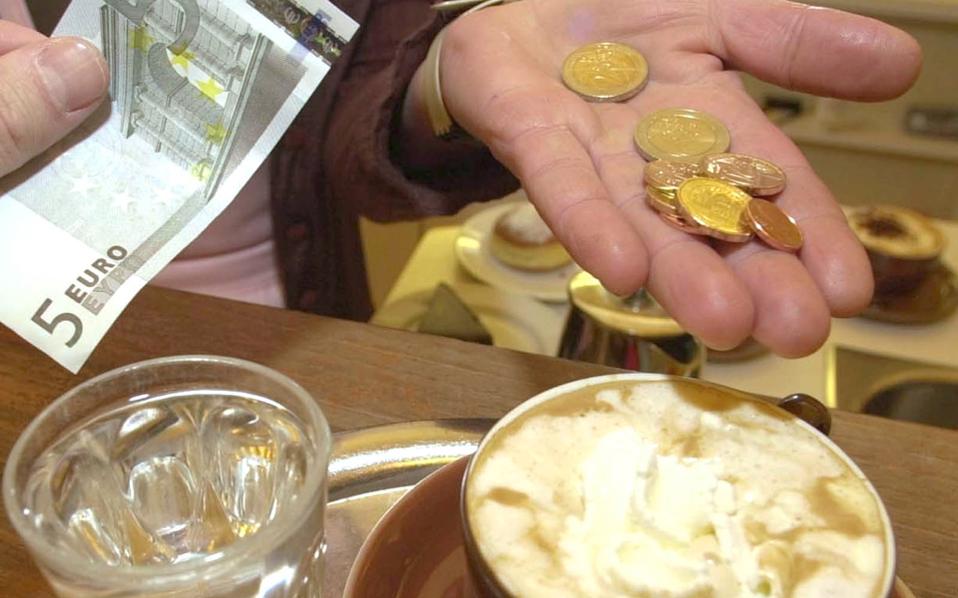‘If they’ve had a good time, it shows in the tip’

The group was large and lively. They had booked a private table in a room reserved for elite customers. The wine flowed, the plates of mezedes went back and forth. At the request of the merry customers, the radio had been tuned to a Greek folk station. “You’re the best, to your health!” they cried. By the eighth carafe of wine, the bill was requested. It had reached 500 euros. “Can we get an invoice, please?” said the man at the head of the table. They paid and left. On the table, two euros in 20-cent coins had been left as a tip.
“Obviously their company was paying,” says F.S., the waiter. “Too often at corporate tables people don’t bother leaving a tip. I don’t know why; maybe, because someone else is paying, they don’t think of it.” In this restaurant, the policy is that the tips of the evening are shared between the waitstaff. Most establishments share out tips to reward good service. “When customers feel that you have taken care of them, they leave a tip. When there is a problem with their order or they have a complaint, they might simply leave without leaving anything extra. But that’s rare,” adds F.S.
In Greece, tipping is common in restaurants and the entertainment sector, in taxis, hair salons and sometimes for manual labor. Employees say that the crisis has influenced the custom of tipping, which has seen a 30 percent decline. But it has not disappeared. Many of us still leave a small percentage of the bill as a tip, often for the additional reason that we know wages have fallen.
Today, for example, the average hairdresser in the western suburbs of Athens makes no more than 650 euros a month, while a salon assistant might not be paid more than 100-200 euros. “The tips vary depending on the area,” says C.P., a hairdresser in the northern suburbs. “In the northern suburbs, they make a lot, between 500 and 1,000 euros a month; elsewhere much less, almost peanuts. But it’s not unknown for a hairdresser to make between 80 and 100 euros in a day in tips alone. I know girls who have made 600 euros on Christmas Eve or New Year’s Eve.”
In hairdressing, where the tip is given in hand (instead of on the table, as is the case at restaurants), there can be moments of awkwardness. “The girls who do my hair are like friends after so many years,” says O.S. “I sometimes feel I’m insulting them a bit by offering a tip. Also, I think that I give them less because of our relationship.”
The same workers, however, say that tips are not demeaning to them and in fact count toward their salary. “Even a euro counts in a job with so much standing, discomfort and such poor pay. On the other hand, I understand those who have to pay a significant amount for a service and then go around the salon leaving a tip for everyone.”
In most services there is no rule about the amount left as a tip. For delivery services, for example, no more than 1 or 2 euros is expected, regardless of the cost of the order.
It is considered wrong, however, not to leave anything for a worker who goes above and beyond what is normally expected of them.
The rule of 10 percent of the total bill valid in foreign countries is not strictly adhered to in Greece, even at restaurants. Moreover, a large bill does not necessarily result in a large tip.
“Sometimes, when someone feels that they paid more than the meal was worth, they’ll leave a smaller tip,” says F.S. “I’ve seen a table with a large bill leave 1 percent while at another table where the patrons enjoyed themselves, they left 30 percent. It’s a matter of the overall experience. If they’ve had a good time, it shows in the tip.”
Everything started in the inns of 17th century England, where customers gave an amount to waiters on entry to ensure more favorable treatment. “Something to drink,” they were told: “Pour boire,” which was adopted into Greek. Back then, the “tip” showed no gratitude for the services, but it did tend to prevent any mishaps.
The word tip, on the other, is said also to have come from the patrons of pubs in the 18th century, and is an acronym of the phrase “to insure promptness.” Again, it was more like a bribe than anything else. In Turkish, the tip is called baksheesh and was once required by law. That is where the Greek word, bachshishi, stems from, which describes a situation where we pay for something unhappily or when it is overpriced. Whatever you call it, today the tip has found its place as the informal reward for services well provided.
In most countries, the percentage of a tip in the hospitality sector is 10 percent. It is the rate that has prevailed for convenience, as it requires the consumer to simply move the decimal point by one digit to the left. In the US it’s 15 percent, since the hourly wages are so low that waiters rely on tips for their livelihood.
In Sweden the service is included in the bill, and customers leave the appropriate amount on the table, rounding it up to the next krona. In Egypt and in Israel it’s the same, and the customer is free to leave a little something extra if they are happy with the service.
In France, the tip is also included in the total bill, and if they want to leave something extra, it is usually a very small amount; tips are also not normally left at the bar. In Thailand it is not common to tip, but because of tourism, businesses have adjusted to the custom. In Japan, it can even be seen as an insult to leave more at the restaurant that you owe. In Australia it can be considered impolite to leave a tip because it is thought to imply that the employee is not paid enough, while in China visitors are not required to leave anything on the table.
In the US, where tipping translates into an annual turnover of up to 50 billion dollars, views have been expressed in recent years in favor of abolishing the custom. The main reason given is that the tips keep waitstaff trapped in poverty while at the same time being vulnerable to discrimination.





